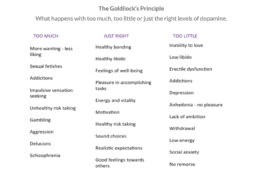Within any one system this process is called homeostasis. For instance adults need 6-8 hours of sleep a night and adolescents need more. They need sleep to help the brain and body restore itself, do any repair, consolidate memories and heal. The body keeps levels of blood sugar, blood pressure and water at a constant level within a narrow range. When several systems communicate and regulate among themselves to keep balance and adapt as conditions change, the process is called allostasis. It is a more dynamic system of balance, regulating several systems at once.
We can enjoy the ‘rewards’ of food or sex. When we have had enough to meet our bodily needs, our brain sends a satiation signal telling us to stop. Then we can get on with other activities necessary for everyday living. If we ignore the signals and keep going, we can throw the body out of balance. For instance, when we keep ‘bingeing’ on a substance or behaviour, the satiation mechanism can be put on hold temporarily. Satiation is overridden. In other words, our brain can start to interpret the bingeing as a ‘survival’ need. It can then allow us to continue to indulge ourselves temporarily. Imagine a bear before hibernation for the winter when it can swallow 20 salmon at a time without being ill. Or consider mating season in the springtime when animals will seek to fertilise as many mates as possible.
Mating season never ends
Internet pornography appears to the brain like the mating season, but a mating season that never ends. Remember our primitive brain evolved at a time of scarcity. The primitive brain sees internet porn as a ‘feeding frenzy’. It is a huge, free fertilization opportunity, which drives us ‘to get it while the getting is good’. With constant bingeing, the brain interprets the never-before-experienced bonanza as a survival need. Quite quickly it will seek to adapt by switching the brain’s satiation mechanism off.
Internet companies use the best scientific research available to make habit forming products that keep us watching. See this TED talk by Nir Eyal.
Our attention is the business model of the internet according to Sir Tim Berners Lee, the father of the world wide web. Its value to advertisers is like gold. There’s no such thing as a free game or video on the internet. Every time we click a ‘like’ on social media or watch a new video, hundreds of companies are collecting that data and building a profile on us. The more we become addicted to the internet, they more money the advertisers make from us. Addiction means we have less attention and brain power available to learn skills, make our own money or build a career.



